1061 scholarly books by Catholic University of America Press and 54
have author last names that start with W
1061 scholarly books by Catholic University of America Press and 54
1061 scholarly books by Catholic University of America Press
54 have author last names that start with W have author last names that start with W
54 have author last names that start with W have author last names that start with W
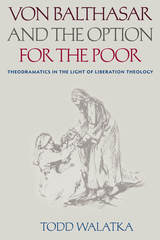
Von Balthasar & the Option for the Poor
Theodramatics in the Light of Liberation Theology
Todd Walatka
Catholic University of America Press, 2017
Hans Urs von Balthasar’s vast corpus of theological, philosophical, literary, and pastoral writings remains one of the most impressive achievements in 20th century thought. In light of liberation theology and now the papacy of Francis, however, a theological affirmation of the option for the poor remains dangerously weak in Balthasar’s corpus. Von Balthasar and the Option for the Poor offers a sympathetic reforming of Balthasar’s account of the drama of salvation – what he calls “theodramatics” – in response to this weakness.
[more]
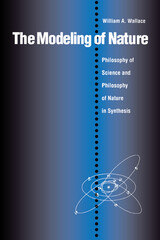
The modeling of nature
philosophy of science and philosophy of nature in synthesis
William A Wallace
Catholic University of America Press, 1996
The Modeling of Nature provides an excellent introduction to the fundamentals of natural philosophy, psychology, logic, and epistemology.
[more]
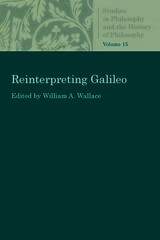
Reinterpreting Galileo
William A. Wallace
Catholic University of America Press, 2018
A collection of papers to mark the 350th anniversary of the publication of Galileo's Dialogue
[more]
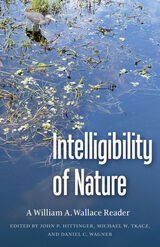
Intelligibility of Nature
A William A. Wallace Reader
William A. Wallace
Catholic University of America Press, 2022
The intelligibility of nature was a persistent theme of William A. Wallace, OP, one of the most prolific Catholic scholars of the late twentieth century. This Reader aims to make available a representative selection of his work in the history of science, natural philosophy, and theology illustrating his defense and development of this central theme. Wallace is among the most important Galileo scholars of the past fifty years and a key figure in the recent revival of scientific realism. Further, his long and productive scholarly career has been shaped by a continuous effort to bring the resources of the Aristotelian-Thomistic tradition to the solution of contemporary problems of philosophy and science. Through all of these contributions, Wallace has provided the foundation for a renewed confidence in the capacity of human knowers to attain understanding of the natural order. Consequently, the overall aim of this volume is to secure continued access to his scholarship for readers in the new millennium.
The Intelligibility of Nature will contain twenty-nine previously published essays written by Wallace over a period of some forty years. Many of these essays are currently not readily accessible. They are arranged in five thematic groups, each representing a major subject-area of Wallace's scholarly interests. The first group is devoted to essays on making nature intelligible through the use of scientific models. The second group of essays investigates various ways in which the Aristotelian-Thomistic tradition is foundational to contemporary scientific research. Essays in the third group are historical studies on the origins of modern science. The fourth group of essays discuss the viability of the cosmological argument for the existence of God in light of natural science. The final group of essays consider the relation of science and religion. Together these essays provide a representative sample of Wallace's multifaceted contributions to scholarship.
[more]
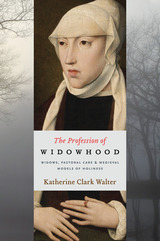
The Profession of Widowhood
Widows, Pastoral Care, and Medieval Models of Holiness
Katherine Clark Walter
Catholic University of America Press, 2018
The Profession of Widowhood explores how the idea of ‘true’ widowhood was central to pre-modern ideas concerning marriage and of female identity more generally. The medieval figure of the Christian vere vidua or “good” widow evolved from and reinforced ancient social and religious sensibilities of chastity, loyalty and grief as gendered ‘work.’ The ideal widow was a virtuous woman who mourned her dead husband in chastity, solitude, and most importantly, in perpetuity, marking her as “a widow indeed” (1 Tim 5:5). The widow who failed to display adequate grief fulfilled the stereotype of the ‘merry widow’ who forgot her departed spouse and abused her sexual and social freedom. Stereotypes of widows ‘good’ and ‘bad’ served highly-charged ideological functions in pre-modern culture, and have remained durable even in modern times, even as Western secular society now focuses more on a woman’s recovery from grief and possible re-coupling than the expectation that she remain forever widowed. The widow represented not only the powerful bond created by love and marriage, but also embodied the conventions of grief that ordered the response when those bonds were broken by premature death. This notion of the widow as both a passive memorial to her husband and as an active ‘rememberer’ was rooted in ancient traditions, and appropriated by early Christian and medieval authors who used “good” widowhood to describe the varieties of female celibacy and to define the social and gender order. A tradition of widowhood characterized by chastity, solitude, and permanent bereavement affirmed both the sexual mores and political agenda of the medieval Church. Medieval widows—both holy women recognized as saints and ‘ordinary women’ in medieval daily life—recognized this tradition of professed chastity in widowhood not only as a valuable strategy for avoiding remarriage and protecting their independence, but as a state with inherent dignity that afforded opportunities for spiritual development in this world and eternal merit in the next.
[more]
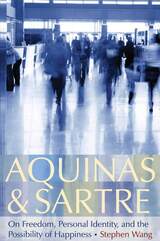
Aquinas and Sartre
On Freedom, Personal Identity, and the Possibility of Happiness
Stephen Wang
Catholic University of America Press, 2009
Thomas Aquinas and Jean-Paul Sartre are usually identified with completely different philosophical traditions: intellectualism and voluntarism. In this original study, Stephen Wang shows, instead, that there are some profound similarities in their understanding of freedom and human identity.
[more]
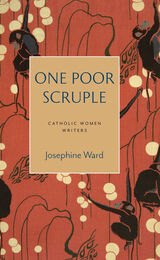
One Poor Scruple
Josephine Ward
Catholic University of America Press, 2022
The Catholic University of America Press is pleased to continue to present new volumes in our Catholic Women Writers series, which will shed new light on prose work of Catholic women writers from the 19th and 20th centuries.
Josephine Ward is one of Catholicism’s greatest literary treasures and a foremost contributor to English literary history – except that she has all but completely fallen from the historical record. She spent her life in close companionship with the most active minds working in the late 19th century to restore to the Catholic Church in England the intellectual, sacramental and theological integrity it had once enjoyed before three hundred years of persecution. All seven of her novels are out of print, despite their once high acclaim in the fin de siècle literary world.
First published in 1899, One Poor Scruple follows the recusant Riversdale family who have survived the long penal years by observing a quiet aristocratic life of sport and agriculture, never stepping into the public sphere from which Catholics in Britain had been barred for so long. But at the start of the twentieth century, a new generation has emerged. The novel’s younger characters are now legally able to go to Oxford and Cambridge and to enter the public life of letters. Emboldened by the confident work of John Henry Newman, this younger generation of Catholics are nonetheless cautioned not to trust the Protestant establishment. One Poor Scruple is a coming-of-age story in which the new generation of more worldly Catholics search for love, friendship and intellectual emancipation in the decadent social world of Edwardian London. Decades before Evelyn Waugh examined in Brideshead Revisited the human struggle to distinguish between true and false beauty, Ward’s novel examined the challenge of discerning between conflicting desires and of living a life that is as truthful and good as it is beautiful.
[more]
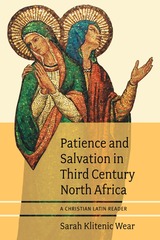
Patience and Salvation in Third Century North Africa
A Christian Latin Reader
Sarah Wear
Catholic University of America Press, 2022
Patience and Salvation in Third Century North Africa: A Christian Latin Reader features the entirety of Tertullian’s To Martyrs and The Passion of Perpetua and Felicity, with selections from Cyprian’s On the Good of Patience and a short appendix on Augustine’s Commentary on Psalm 121.6. The Latin text has facing vocabulary and theological, historical, philosophical, and grammatical notes.
In the first three centuries, Roman Carthage produced some of the earliest literature composed originally in Latin by Christians. Tertullian’s Ad Martyras (197); Passio Perpetuae et Felicitatis (203), and Cyprian’s De Bono Patientiae (256) all embody the force of this new genre of Latin literature. With this literature, we see a variant of Latin often denoted “Christian Latin.” Christian Latin featured linguistic elements marked by characteristics of biblical Latin, later Latin, as well as vulgarisms.
In addition to converging philologically, Tertullian, the author of the Passio, and Cyprian align themselves in topos: they all ask the question of how one can endure torment and anxiety in this world. Patience (patientia), derived from the verb for “to suffer” (patior), is a virtue that allows one to endure troubles, anxieties, and physical pains with the hope of eternal happiness and salvation in heaven. In this Reader, the student will find three different literary perspectives on this theme. The book also draws parallels to the works of Seneca and Cicero on patience and suffering.
[more]
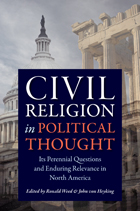
Civil Religion in Political Thought
Ronald Weed
Catholic University of America Press, 2010
The essays in this volume blend historical and philosophical reflection with concern for contemporary political problems. They show that the causes and motivations of civil religion are a permanent fixture of the human condition, though some of its manifestations and proximate causes have shifted in an age of multiculturalism, religious toleration, and secularization
[more]
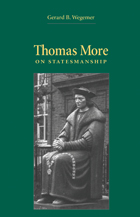
Thomas More on Statesmanship
Gerard Wegemer
Catholic University of America Press, 1996
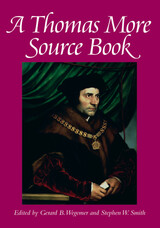
A Thomas More Source Book
Gerard B. Wegemer
Catholic University of America Press, 2004
This Source Book brings together classic texts by and about Thomas More--poet, scholar, statesman, family man, educational reformer, philosopher, historian, and saint
[more]
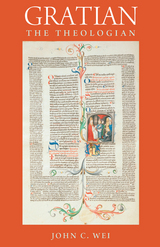
Gratian the Theologian
John C. Wei
Catholic University of America Press, 2016
Gratian the Theologian shows how one of the best-known canonists of the medieval period was also an accomplished theologian. Well into the twelfth century, compilations of Church law often dealt with theological issues. Gratian's Concordia discordantium canonum or Decretum, which was originally compiled around 1140, was no exception, and so Wei claims in this provocative book. The Decretum is the fundamental canon law work of the twelfth century, which served as both the standard textbook of canon law in the medieval schools and an authoritative law book in ecclesiastical and secular courts. Yet theology features prominently throughout the Decretum, both for its own sake and for its connection to canon law and canonistic jurisprudence.
[more]
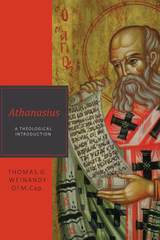
Athansius
A Theological Introduction
Thomas G. Weinandy, OFM, Cap.
Catholic University of America Press, 2018
Thomas Weinandy has done an excellent job in this book in introducing Athanasius' theology. A well-known Catholic scholar in historical theology, Weinandy has provided students of theology with a profound historiography of Athanasius' major theological writing. - Calvin Theological Journal
"A reliable, concise introduction to the theology of Athanasius." - International Journal of Systematic Theology
"A sustained and intelligent introduction to Athanasius and his literature, and will rightly appear on all undergraduate patristic bibliographies." - The Journal of Theological Studies
"A very fine theological (as its subtitle emphasizes) introduction to the Alexandrian bishop…[an] accessible, intelligent, and worthy volume, which offers the reader an overview of Athanasius's thought within the context of his full, if at times harried, ecclesiastical life." - Nova et Vetera
"Weinandy offers a summary of Athanasius' central works and a balanced assessment of his theology's merits and contemporary significance…No student of Athanasius should overlook this reliable guidebook to the little Alexandrian's great life and works." - Religious Studies Review
"Weinandy's introduction to Athanasius is an important work, familiarizing the reader with Athanasius' life, writings, and fundamental concerns. Throughout, the centrality of soteriology clearly emerges, whether the topic is the doctrine of the Trinity or the life of Antony. Hopefully this book will serve to bring Athanasius' soteriology more prominently into contemporary discussions alongside the other great masterpieces on this doctrine." - Themelios
"A reliable, concise introduction to the theology of Athanasius." - International Journal of Systematic Theology
"A sustained and intelligent introduction to Athanasius and his literature, and will rightly appear on all undergraduate patristic bibliographies." - The Journal of Theological Studies
"A very fine theological (as its subtitle emphasizes) introduction to the Alexandrian bishop…[an] accessible, intelligent, and worthy volume, which offers the reader an overview of Athanasius's thought within the context of his full, if at times harried, ecclesiastical life." - Nova et Vetera
"Weinandy offers a summary of Athanasius' central works and a balanced assessment of his theology's merits and contemporary significance…No student of Athanasius should overlook this reliable guidebook to the little Alexandrian's great life and works." - Religious Studies Review
"Weinandy's introduction to Athanasius is an important work, familiarizing the reader with Athanasius' life, writings, and fundamental concerns. Throughout, the centrality of soteriology clearly emerges, whether the topic is the doctrine of the Trinity or the life of Antony. Hopefully this book will serve to bring Athanasius' soteriology more prominently into contemporary discussions alongside the other great masterpieces on this doctrine." - Themelios
[more]
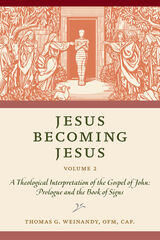
Jesus Becoming Jesus, Volume 2
A Theological Interpretation of the Gospel of John: Prologue and the Book of Signs
Thomas G. Weinandy
Catholic University of America Press, 2021
Jesus Becoming Jesus, Volume 2: A Theological Interpretation of the Gospel of John: Prologue and the Book of Signs follows upon the first volume of this series entitled Jesus Becoming Jesus. The first volume was a theological interpretation of the Gospels of Matthew, Mark and Luke. Unlike many conventional biblical commentaries, Weinandy concentrates on the theological content contained within John’s Gospel. He does this in the light of the Church’s doctrinal and theological tradition, particularly in keeping with the Second Vatican Council’s Dogmatic Constitution, Dei Verbum. This is accomplished through a close reading of John’s Gospel, theologically interpreting each chapter of the Gospel sequentially. In so doing he also takes into account the Johannine corpus as a whole. He also relates John’s Gospel to relevant material found within the Synoptic Gospels, the Pauline Corpus and other New Testament writings.
This original theological interpretation focuses primarily on the intertwining theological themes contained within John’s Gospel, specifically within the Prologue and the Book of Signs – light and darkness, the seven miracle-signs, the sacraments of baptism and the Eucharist, the seven “I Am” sayings, the contentious dialogues with the Jews, Jesus’ relationship to his Father as the Father’s incarnate Word and Son, etc. Within all of these interlocking themes one finds the importance of Jesus’ saving actions – the salvific works of his Father. The overarching theme of this book, as the title suggests, is that Jesus, being named Jesus, throughout his public ministry is enacting his name and so becoming who he is – YHWH-Saves.
Weinandy offers a singular, vibrant, and luminous reading of John’s Gospel; one that reveals the Evangelist’s theological depth and doctrinal sophistication. In so doing, Weinandy makes manifest the particular beauty of the Gospel According to John.
[more]
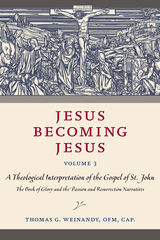
Jesus Becoming Jesus, Volume 3
A Theological Interpretation of the Gospel of John: The Book of Glory and the Passion and Resurrection
Thomas G. Weinandy
Catholic University of America Press, 2022
Jesus Becoming Jesus, Volume 3 follows upon the previous two volumes of this series entitled Jesus Becoming Jesus. Volume 1 was a theological interpretation of the Gospels of Matthew, Mark and Luke, and volume 2 was a theological interpretation of the Prologue and Book of Signs of John’s Gospel (chapters 1-12). Unlike many conventional biblical commentaries, Weinandy concentrates on the theological content contained within John’s Gospel. This is accomplished through a close reading of John’s Gospel, theologically interpreting each chapter of the Gospel sequentially. In so doing he also takes into account the Johannine corpus as a whole. He also relates John’s Gospel to relevant material found within the Synoptic Gospels, the Pauline Corpus and other New Testament writings.
In this present volume, Weinandy’s original theological interpretation focuses first on the Evangelist’s narrative of the Last Supper, which includes Jesus’ washing of his disciples’ feet, followed upon his lengthy farewell address and his ensuing High Priestly Prayer (chapter 13-17). Although Jesus speaks of his leaving his disciples, yet their hearts should not be troubled, for he is going to prepare a place for them in his Father’s house, and he will also send them another Counselor, the Holy Spirit. The Holy Spirit will not only convict the world sin, but he will also empower the disciples to profess their faith in Jesus as the Father’s Son, even in the midst of persecution. All that Jesus tells his disciple in his final discourse, he then prays that his Father will accomplish through his forthcoming death and resurrection – above all that his disciples will share in the same oneness of love that he and his Father possess.
Weinandy masterfully treats John’s Passion and Resurrection Narratives. He not only theologically interprets the uniqueness of the Evangelist’s narratives, but also how his narratives insect with the Synoptic accounts. Moreover, Weinandy’s theological reading of Jesus’ crucifixion and resurrection weaves together John’s soteriology, ecclesiology, and sacramentality – all of which are founded upon the Incarnation, that Jesus is the Father’s Spirit-filled incarnate Son. As the title suggests, Jesus, being named Jesus, in his death and resurrection, definitively enacts his name and so becoming who he is – YHWH-Saves.
[more]

The Unity of Faith
Essays for the Building Up of the Body of Christ
Thomas G. Weinandy
Catholic University of America Press, 2024
In this volume, The Unity of Faith: Essays for the Building Up of the Body of Christ, Thomas G. Weinandy, OFM, Cap., has compiled a theologically significant medley of essays. The title is taken from Ephesians 4:11–13 (“And his gifts were … for building up the body of Christ, until we all attain to the unity of the faith and of the knowledge of the Son of God….”). The “unity of faith” in this book refers both to the interrelation between the truths of the faith, whether
Trinitarian, Christological, or ecclesiological, and to unity among those who hold the faith.
The first section deals with the Trinity, usually with ecumenical questions in mind, ranging from the question of the filioque to the trinitarian thought of Johnathan Edwards. The second section
presents the author’s mature judgments in a topic for which Weinandy has become notable—the impassability of God and the human suffering of Christ. The third looks at other aspects of Christology with the help of patristic writers, but for sake of the contemporary theological milieu. For example, what is the relationship between the Incarnation and soteriology? What is the nature of Christ’s human consciousness and knowledge? How does Paul perceive the primacy of Christ within his Christological hymns?
The fourth section turns to the unity between faith and reason. In doing Catholic theology, how do theologians apply reason when contemplating the mysteries of faith? What is the philosophical and theological significance of Pope John Paul II’s encyclical, Fides et Ratio? The final section turns to the life of believers in the unity of faith, with topics such as Henri de Lubac’s contributions to ecclesiology, the sacramentality of the Catholic priesthood, the very
delicate issue of the need for conversion and the Jews in relationship to the Church, and the Christian family as a domestic church, taking up the roles of priest, prophet, and king. Weinandy invariably writes in a clear and engaging manner, so much so that these essays will
bring to the greater knowledge of God not only academics and students of theology, but also the educated laity.
[more]
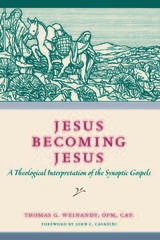
Jesus Becoming Jesus
A Theological Interpretation of the Synoptic Gospels
Thomas Weinandy
Catholic University of America Press, 2018
Jesus Becoming Jesus presents a theological interpretation of the Gospels of Matthew, Mark and Luke. Unlike many conventional biblical commentaries, Weinandy concentrates on the theological content contained within the Synoptic Gospels. He does thi
[more]
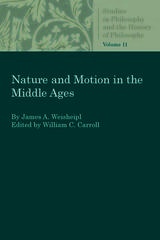
Nature and Motion in the Middle Ages
James A. Weisheipl
Catholic University of America Press, 2018
The essays contained in this volume illustrate the work of Fr. James A. Weisheipl, whose writing and teaching have resulted in important additions to our understanding of nature and motion.
[more]
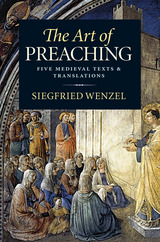
The Art of Preaching
Siegfried Wenzel
Catholic University of America Press, 2013
Based on his wide-ranging knowledge of late-medieval Latin sermons from England as well as his editorial experience with medieval Latin texts, Siegfried Wenzel offers critical editions of five instruction manuals on the "art of preaching" dating from 1230 to the fifteenth century. Four of the texts are edited and translated for the first time; the fifth is re-edited from all extant manuscripts. Each of the five sermons is accompanied by a facing-page translation into English. The book aims to stimulate interest and new research in a field that still awaits closer analysis of the relationships among existing treatises and of their historical development.
[more]
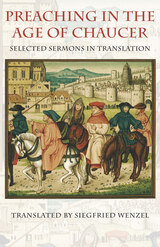
Preaching in the Age of Chaucer
Selected Sermons in Translation (Medieval Texts in Translation Series)
Siegfried Wenzel
Catholic University of America Press, 2008
Introducing modern readers to the riches of preaching in later medieval England, distinguished scholar Siegfried Wenzel offers translations of twenty-five Latin sermons written between 1350 and 1450. T
[more]
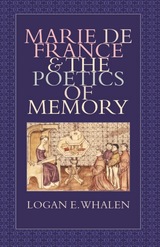
Marie de France and the Poetics of Memory
Logan E. Whalen
Catholic University of America Press, 2008
Marie de France and the Poetics of Memory presents the first exhaustive treatment of the rhetorical use of description and memory in all the narrative works of the late 12th-century poet, Marie de France--the first woman to compose literary texts in French.
[more]
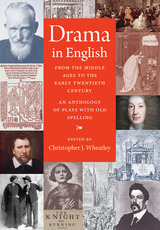
Drama in English From the Middle Ages to the Early Twentieth Century
Christopher J. Wheatley
Catholic University of America Press, 2016
At a time when good editions of drama in English are prohibitively expensive and online texts are unedited and lack the apparatus necessary for students to understand and contextualize the plays, this anthology affordably illustrates every significant genre of drama in the English language from the late fourteenth century to the early twentieth century, with plays from England, Ireland, and the United States of America. The mystery and morality plays of the Middle Ages, Renaissance comedy, tragedy and meta-theater, Restoration and eighteenth-century comedy, tragedy, and ballad opera, nineteenth-century melodrama, and early twentieth century realism and naturalism are all presented with the introductions glossaries and notes suitable for a college level reader by an editor with a quarter of a century of experience teaching courses on the history of drama in English. The plays both reflect their times and critique them, while remaining stageable today. The Wakefield Master, The York Realist, Marlowe, Jonson, Dryden, Wycherley, Gay, Boucicault, Synge, and Shaw are some of the playwrights in this representative collection of plays that reveal both the popular appeal of the English-language theater and the dazzling dramatic artistry it embodied over a period of six centuries. Further the collection is in "old spelling" and is thus a useful sourcebook for those interested in the history of the English language.
[more]
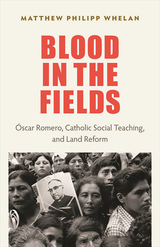
Blood in the Fields
Óscar Romero, Catholic Social Teaching, and Land Reform
Matthew Philipp Whelan
Catholic University of America Press, 2020
On March 24, 1980, a sniper shot and killed Archbishop Óscar Romero as he celebrated mass. Today, nearly four decades after his death, the world continues to wrestle with the meaning of his witness.
Blood in the Fields: Óscar Romero, Catholic Social Teaching, and Land Reform treats Romero’s role in one of the central conflicts that seized El Salvador during his time as archbishop and that plunged the country into civil war immediately after his death: the conflict over the concentration of agricultural land and the exclusion of the majority from access to land to farm. Drawing extensively on historical and archival sources, Blood in the Fields examines how and why Romero advocated for justice in the distribution of land, and the cost he faced in doing so.
In contrast to his critics, who understood Romero’s calls for land reform as a communist-inspired assault on private property, Blood in the Fields shows how Romero relied upon what Catholic Social Teaching calls the common destination of created goods, drawing out its implications for what property is and what possessing it entails. For Romero, the pursuit of land reform became part of a more comprehensive politics of common use, prioritizing access of all peoples to God’s gift of creation.
In this way, Blood in the Fields reveals how close consideration of this conflict over land opened up into a much more expansive moral and theological landscape, in which the struggle for justice in the distribution of land also became a struggle over what it meant to be human, to live in society with others, and even to be a follower of Christ. Understanding this conflict and its theological stakes helps clarify the meaning of Romero’s witness and the way God’s work to restore creation in Christ is cruciform.
[more]
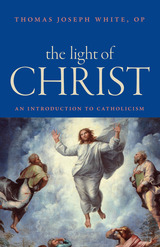
The Light of Christ
An Introduction to Catholicism
Thomas Joseph White, OP
Catholic University of America Press, 2017
The Light of Christ provides an accessible presentation of Catholicism that is grounded in traditional theology, but engaged with a host of contemporary questions or objections. Inspired by the theologies of Iranaeus, Thomas Aquinas and John Henry Newman, and rooted in a post-Vatican II context, Fr. Thomas Joseph White presents major doctrines of the Christian religion in a way that is comprehensible for non-specialists: knowledge of God, the mystery of the Trinity, the Incarnation and the atonement, the sacraments and the moral life, eschatology and prayer.
At the same time, The Light of Christ also addresses topics such as evolution, the modern historical study of Jesus and the Bible, and objections to Catholic moral teaching. Touching on the concerns of contemporary readers, Fr. White examines questions such as whether Christianity is compatible with the findings of the modern sciences, do historical Jesus studies disrupt or confirm the teaching of the faith, and does history confirm the antiquity of Catholic claims.
This book serves as an excellent introduction for young professionals with no specialized background in theology who are interested in learning more about Catholicism, or as an introduction to Catholic theology. It will also serve as a helpful text for theology courses in a university context.
As Fr. White states in the book’s introduction: “This is a book that offers itself as a companion. I do not presume to argue the reader into the truths of the Catholic faith, though I will make arguments. My goal is to make explicit in a few broad strokes the shape of Catholicism. I hope to outline its inherent intelligibility or form as a mystery that is at once visible and invisible, ancient and contemporary, mystical and reasonable.”
At the same time, The Light of Christ also addresses topics such as evolution, the modern historical study of Jesus and the Bible, and objections to Catholic moral teaching. Touching on the concerns of contemporary readers, Fr. White examines questions such as whether Christianity is compatible with the findings of the modern sciences, do historical Jesus studies disrupt or confirm the teaching of the faith, and does history confirm the antiquity of Catholic claims.
This book serves as an excellent introduction for young professionals with no specialized background in theology who are interested in learning more about Catholicism, or as an introduction to Catholic theology. It will also serve as a helpful text for theology courses in a university context.
As Fr. White states in the book’s introduction: “This is a book that offers itself as a companion. I do not presume to argue the reader into the truths of the Catholic faith, though I will make arguments. My goal is to make explicit in a few broad strokes the shape of Catholicism. I hope to outline its inherent intelligibility or form as a mystery that is at once visible and invisible, ancient and contemporary, mystical and reasonable.”
[more]
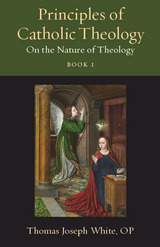
Principles of Catholic Theology, Book 1
On the Nature of Theology
Thomas Joseph White, OP
Catholic University of America Press, 2023
Catholic theology has to face a certain number of fundamental questions: what is the nature and content of Christian revelation, what are the sources of revelation, how are the mysteries of the faith to be understood in relation of one to another, and how do the truths of the Catholic faith relate to the acquisitions of natural reason. In the contemporary context, Catholic theology is marked by a diversity of approaches, many of which are seemingly incompatible or estranged from one another. How might we think about the unity of Catholic theology over and above the diversity of forms? What role, if any, can Aquinas play as a common doctor in facilitating exchanges between theological traditions in the Church?
Principles of Catholic Theology seeks to address directly the nature of Catholic theology and the challenge of its contemporary articulation with an eye towards its articulation in its Thomistic key. This book is also the first of a series of collections of essays by Thomas Joseph White, OP, extending over a range of fundamental topics in Catholic dogmatic theology.
[more]

Principles of Catholic Theology, Book 2
On the Rational Credibility of Christianity
Thomas Joseph White, OP
Catholic University of America Press, 2023
Can a philosopher defend the rational warrant for belief in Christianity? Is it reasonable to be religious? Is it philosophically responsible to be a Christian who believes in the mystery of the Trinity? Principles of Catholic Theology explores these questions in a systematic way by considering questions of ultimate explanation. Why not hold that modern atheistic naturalism provides the best explanation of reality? Or, if there is a transcendent first principle that explains all of reality, is it impersonal rather than personal? Contrastingly, if monotheism constitutes the best explanation for created being, how can we reasonably believe in any particular revelation concerning God? What are the criteria for rational belief in revelation?
Thomas Joseph White, OP, considers these questions by exploring a series of topics: the transcendentals (existence, oneness, truth, goodness, beauty); rational argument for the existence of God; the immateriality and subsistence after death of the personal soul of the human being; the historical and conceptual coherence of Trinitarian doctrine; and the reasonableness of the natural desire to see God. The aim of Principles of Catholic Theology, Book 2 is to place contemporary natural reason in profound dialogue with the Catholic faith and to think about ways that we can consent to the profound mystery of the Holy Trinity that are in robust concord with the knowledge obtained from philosophical, scientific, and historical sources.
[more]
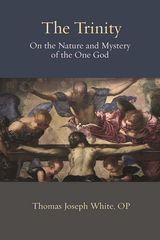
The Trinity
On the Nature and Mystery of the One God
Thomas Joseph White, OP
Catholic University of America Press, 2021
The Trinity is the central mystery of the Christian faith. What can we say about the divine nature, and what does it mean to say that God is Father, Son, Holy Spirit, three persons who are one in being? In this book, best selling author Thomas Joseph White, OP, examines the development of early Christian reflection on the Trinity, arguing that essential contributions of Patristic theology are preserved and expanded in the thought of Thomas Aquinas.
By focusing on Aquinas’ theology of the divine nature as well as his treatment of divine personhood, White explores in depth the mystery of Trinitarian monotheism. The Trinity: On the Nature and Mystery of the One God also engages with influential proposals of modern theologians on major topics such as Trinitarian creation, Incarnation and crucifixion, and presents creative engagements with these topics. Ultimately any theology of the cross is also a theology of the Trinity, and this book seeks to illustrate how the human life, death, and resurrection of Jesus reveal the inner life of God as Trinity.
[more]
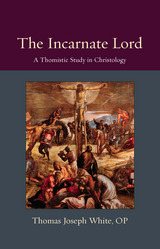
The Incarnate Lord
Thomas Josepth White, OP
Catholic University of America Press, 2015
The Incarnate Lord, then, considers central themes in Christology from a metaphysical perspective. Particular attention is given to the hypostatic union, the two natures of Christ, the knowledge and obedience of Jesus, the passion and death of Christ, his descent into hell, and resurrection. A central concern of the book is to argue for the perennial importance of ontological principles of Christology inherited from patristic and scholastic authors. However, the book also seeks to advance an interpretation of Thomistic Christology in a modern context. The teaching Aquinas, then, is central to the study, but it is placed in conversation with various modern theologians, such as Karl Barth, Karl Rahner and Hans Urs von Balthasar. Ultimately the goal of the work is to suggest how traditional Catholic theology might thrive under modern conditions, and also develop fruitfully from engaging in contemporary controversies.
[more]
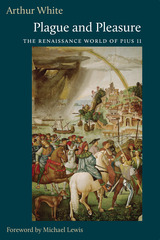
Plague and Pleasure
The Renaissance World of Pius II
Arthur White
Catholic University of America Press, 2014
Plague and Pleasure is a lively popular history that introduces a new hypothesis about the impetus behind the cultural change in Renaissance Italy. The Renaissance coincided with a period of chronic, constantly recurring plague, unremitting warfare and pervasive insecurity. Consequently, people felt a need for mental escape to alternative, idealized realities, distant in time or space from the unendurable present but made vivid to the imagination through literature, art, and spectacle.
[more]
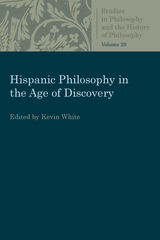
Hispanic Philosophy in the Age of Discovery
Kevin White
Catholic University of America Press, 2018
This volume presents 15 studies occasioned by the 500th anniversary of the European discovery of America. It covers both the initial encounters between the Europeans and native Americans and the golden age of Hispanic philosophy that followed the discover
[more]

Principles of Catholic Theology, Book 3
On God, Trinity, Creation, and Christ
Thomas Joseph White
Catholic University of America Press, 2024
What if anything can human beings know about God, either by way of philosophical reasoning or by divine revelation? How does the mystery of the Incarnation illuminate our understanding of the nature and mystery of God and the nature and destiny of the human person? The essays in this book explore topics pertaining to the nature of God, apophatic theology, divine simplicity and the holy Trinity, divine beauty, and the beauty of creation. The book also contains a series of speculative considerations of Christology: Why did God become human? How ought we understand the two natures of Christ and the topic of the communication of idioms (attribution of both divine and human properties to one person)? There is also a sustained treatment of Jesus' human knowledge and voluntary freedom. Did Jesus understand his own lordship and his unity with the Father and the Holy Spirit, and if so, how? Did Christ's human will always accord with the divine will, and what significance does this idea have for our understanding of the redemption affected by Christ for the whole human race? Through these explorations, principles drawn from Thomas Aquinas and from Thomistic tradition are taken into account as key resources for the adjudication of contemporary theological challenges.
Principles of Catholic Theology, Book 3 is a continuation of Fr. Thomas Joseph White's collection of essays, extending over a range of fundamental topics in Catholic dogmatic theology.
[more]
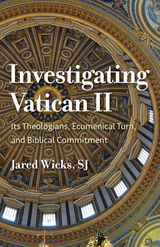
Investigating Vatican II
Its Theologians, Ecumenical Turn, and Biblical Commitment
Jared Wicks
Catholic University of America Press, 2018
Investigating Vatican II is a collection of Fr. Jared Wicks’ recent articles on Vatican II, and presents the Second Vatican Council as an event to which theologians contributed in major ways and from which Catholic theology can gain enormous insigh
[more]
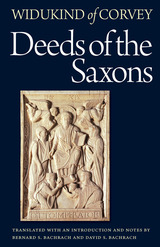
Deeds of the Saxons
Widukind of Corvey
Catholic University of America Press, 2014
PleWidukind, a monk at the prominent monastery of Corvey in Saxony during the middle third of the tenth century, is known to posterity through his Res gestae Saxonicae, an exceptionally rich account of the Saxon people and the reigns of the first two rulers of the Ottonian dynasty, Henry I (919-936) and Otto I (936-973). Widukind, likely of noble birth, received a thorough education in both biblical and classical texts. When writing the Gestae, Widukind also had available the extensive library at Corvey, with its large collection of ancient texts as well as numerous works from the eighth and ninth centuries. Widukind drew on these, and even more contemporary written sources to complement and inform orally transmitted information that he received from many sources including people closely associated with the Ottonian royal court. Widukind wrote the Res gestae from the 950s to the 970s, incorporating additional material as he obtained further information and as major new events took place in the German kingdom and beyond. After providing a historical background for the Saxon people Widukind devotes most of his attention to the political and military affairs of the German kingdom, concentrating heavily on affairs of the royal court. Widukind provides information that can be found in no other source. His close relationship with the royal court enabled him to provide an "insider's" view of the people and events that shaped the political and military history of the most powerful kingdom in Europe. As a consequence, the Res gestae is an indispensable account for the history of the German kingdom during the tenth century. Bernard S. Bachrach and David S. Bachrach provide an introduction to the text that contextualizes the author, his historical methods, and the information that he provides. They draw on a large number of other written sources of information, including both narrative works and the political, economic, social, and military affairs of the day, and provide an extensive apparatus of notes.
ase fill in marketing copy
[more]
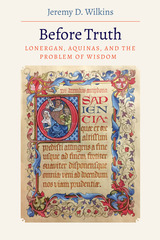
Before Truth
Lonergan, Aquinas, and the Problem of Wisdom
Jeremy Wilkins
Catholic University of America Press, 2018
It’s frequently said that we live in a “post-truth” age. That obviously can’t be true, but it does name a real problem on our hands. Getting things right is hard, especially if they’re complicated. It takes preparation, diligence, and honesty. Wisdom, according to Thomas Aquinas, is the quality of right judgment. This book is about the problem of becoming wise, the problem “before truth.” It is about that problem particularly as it comes up for religious, philosophical, and theological truth claims. Before Truth: Lonergan, Aquinas, and the Problem of Wisdom proposes that Bernard Lonergan’s approach to these problems can help us become wise. One of the special problems facing Christian believers today is our awareness of how much our tradition has developed. This development has occurred along a path shot through with contingencies. Theologians have to be able to articulate how and why doctrines, institutions, and practices that have developed—and are still developing—should nevertheless be worthy of our assent and devotion.
[more]
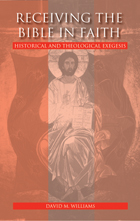
Receiving the Bible in faith
historical and theological exegesis
David M. Williams
Catholic University of America Press, 2004
The book should prove helpful to students as an overview of some of the issues involved, while more advanced readers will appreciate its analysis of recent scholars as well the attempt to integrate and adapt their insights.
[more]
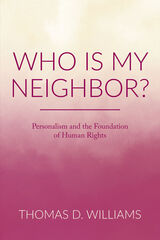
Who is my neighbor?
personalism and the foundations of human rights
Thomas D. Williams
Catholic University of America Press, 2005
Who Is My Neighbor? makes an original, compelling case for human rights as moral entitlements grounded in the dignity of the human person.
[more]
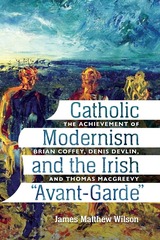
Catholic Modernism and the Irish "Avant-Garde
" The Achievement of Brian Coffey, Denis Devlin, and Thomas MacGreevey
James Matthew Wilson
Catholic University of America Press, 2023
This study constitutes the first-ever definitive account of the life and work of Irish modernist poets Thomas MacGreevy, Brian Coffey, and Denis Devlin. Apprenticed to the likes of W.B. Yeats, T.S. Eliot, James Joyce, and Samuel Beckett, all three writers worked at the center of modernist letters in England, France, and the United States, but did so from a distinctive perspective. All three writers wrote with a deep commitment to the intellectual life of Catholicism and saw the new movement in the arts as making possible for the first time a rich sacramental expression of the divine beauty in aesthetic form. MacGreevy spent his life trying to voice the Augustinian vision he found in The City of God. Coffey, a student of neo-Thomist philosopher Jacques Maritain, married scholastic thought and a densely wrought poetics to give form and solution to the alienation of modern life. Devlin contemplated the world with the eyes of Montaigne and the heart of Pascal as he searched for a poetry that could realize the divine presence in the experience of the modern person. Taken together, MacGreevy, Coffey, and Devlin exemplify the modern Catholic intellectual seeking to engage the modern world on its own terms while drawing the age toward fulfillment within the mystery and splendor of the Church. They stand apart from their Irish contemporaries for their religious seriousness and cosmopolitan openness of European modernism. They lay bare the theological potencies of modern art and do so with a sophistication and insight distinctive to themselves.
Although MacGreevy, Coffey, and Devlin have received considerable critical attention in the past, this is the first book to study their work comprehensively, from MacGreevy’s early poems and essays on Joyce and Eliot to Coffey’s essays in the neo-scholastic philosophy of science, and on to Devlin’s late poetic attempts to realize Dante’s divine vision in a Europe shattered by war and modern doubt.
[more]
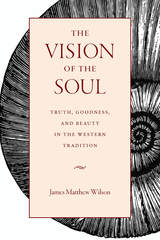
The Vision of the Soul
James Matthew Wilson
Catholic University of America Press, 2017
Ours is an age full of desires but impoverished in its understanding of where those desires lead—an age that claims mastery over the world but also claims to find the world as a whole absurd or unintelligible. In The Vision of the Soul, James Matthew Wilson seeks to conserve the great insights of the western tradition by giving us a new account of them responsive to modern discontents. The western— or Christian Platonist—tradition, he argues, tells us that man is an intellectual animal, born to pursue the good, to know the true, and to contemplate all things in beauty. Wilson begins by reconceiving the intellectual conservatism born of Edmund Burke’s jeremiad against the French Revolution as an effort to preserve the West’s vision of man and the cosmos as ordered by and to beauty. After defining the achievement of that vision and its tradition, Wilson offers an extended study of the nature of beauty and the role of the fine arts in shaping a culture but above all in opening the human intellect to the perception of the form of reality. Through close studies of Theodor W. Adorno and Jacques Maritain, he recovers the classical vision of beauty as a revelation of truth and being. Finally, he revisits the ancient distinction between reason and story-telling, between mythos and logos, in order to rejoin the two.
Story-telling is foundational to the forms of the fine arts, but it is no less foundational to human reason. Human life in turn constitutes a specific kind of form—a story form. The ancient conception of human life as a pilgrimage to beauty itself is one that we can fully embrace only if we see the essential correlation between reason and story and the essential convertibility of truth, goodness and beauty in beauty. By turns a study in fundamental ontology, aesthetics, and political philosophy, Wilson’s book invites its readers to a renewal of the West’s intellectual tradition.
Story-telling is foundational to the forms of the fine arts, but it is no less foundational to human reason. Human life in turn constitutes a specific kind of form—a story form. The ancient conception of human life as a pilgrimage to beauty itself is one that we can fully embrace only if we see the essential correlation between reason and story and the essential convertibility of truth, goodness and beauty in beauty. By turns a study in fundamental ontology, aesthetics, and political philosophy, Wilson’s book invites its readers to a renewal of the West’s intellectual tradition.
[more]
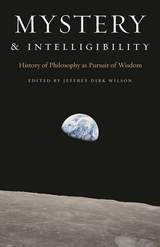
Mystery and Intelligibility
History of Philosophy as Pursuit of Wisdom
Jeffrey Dirk Wilson
Catholic University of America Press, 2021
Philosophy is born in its history as pursuit of the wisdom we are never able fully to know. Mystery and Intelligibility: History of Philosophy as Pursuit of Wisdom both argues for that method and presents the results it can achieve.
Editor Jeffrey Dirk Wilson has gathered essays from six philosophical luminaries. In “History, Philosophy, and the History of Philosophy,” Timothy B. Noone provides the volume’s discourse on method in which he distinguishes three tiers of history. History of philosophy as method occupies the third and highest tier. John Rist reckons with contemporary corruption of the method in “A Guide for the Perplexed or How to Present or Pervert the History of Philosophy.” Wilson’s own essay, “Wonder and the Discovery of Being: From Homeric Myth to the Natural Genera of Early Greek Philosophy,” shows the loss of wonder, so evident in mythology, by early Greek thinkers and its recovery by Plato and Aristotle. In “Metaphysics and the Origin of Culture,” Donald Phillip Verene demonstrates the wide cultural implications of philosophical discoveries even when the discovery is the boundary of what humans can know. William Desmond offers an essay, “Flux-Gibberish: For and Against Heraclitus,” that owes as much to the humor of James Joyce as to the philosophical insights of philosophers, ancient, medieval, and modern. Eric D. Perl’s essay turns to the apophatic character of pursuing wisdom, perhaps especially when asking what may be the most fundamental metaphysical question: “Into the Dark: How (Not) to Ask, ‘Why is There Anything at All.’” Philipp W. Rosemann concludes the volume with the question best asked at the end of this literary seminar, “What is Philosophy?”
Although there are philosophers within the analytic and continental schools who are committed to the history of philosophy, Mystery and Intelligibility demonstrates that history of philosophy as a third and distinct philosophical method is revelatory of the nature and structure of reality.
[more]
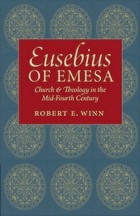
Eusebius of Emesa
Church and Theology in the Mid-Fourth Century
Robert E. Winn
Catholic University of America Press, 2011
Through a careful examination of his extant sermons, some of which survive in Latin and others in classical Armenian, this book invites readers to hear a bishop's voice from the mid- fourth century, an important period in late antique Christianity
[more]
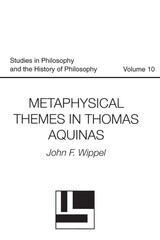
Metaphysical Themes in Thomas Aquinas
John F. Wippel
Catholic University of America Press, 1995
In this volume, John Wippel has collected a number of his essays dealing with Aquinas's metaphysical thought. The volume begins with a presentation and critical evaluation of certain twentieth-century attempts to describe the philosophical thought of Thomas Aquinas as a "Christian philosophy."
[more]
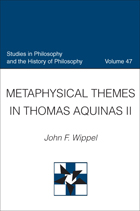
Metaphysical Themes in Thomas Aquinas II
John F. Wippel
Catholic University of America Press, 2007
This volume contains eleven articles and book chapters written by John Wippel since the publication of his Metaphysical Themes in Thomas Aquinas in 1984.
[more]
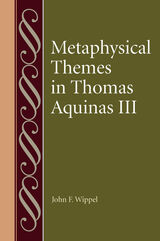
Metaphysical Themes in Thomas Aquinas III
John F. Wippel
Catholic University of America Press, 2020
Metaphysical Themes in Thomas Aquinas III is Msgr. John Wippel’s third volume dedicated to the metaphysical thought of Thomas Aquinas. After an introduction, this volume of collected essays begins with Wippel’s interpretation of the discovery of the subject of metaphysics by a special kind of judgment (“separation”). In subsequent chapters, Wippel turns to the relationship between faith and reason, exploring what are known as the preambles of faith. This is followed by two chapters on the important contributions by Cornelio Fabro on Aquinas’s distinction between essence and esse and on participation. The volume continues with articles on Aquinas’s view of creation as a preamble of faith, Aquinas’s much-disputed defense of unicity of substantial form in creatures, his account of the separated soul’s natural knowledge, and Aquinas’s understanding of evil in his De Malo 1. The volume concludes with an article comparing Bonaventure, Aquinas, and Godfrey of Fontaines on the metaphysical composition of angelic beings.
Most of these issues were disputed during Aquinas’s time by some of his contemporaries, and the proper understanding of each continues to be debated by various students of his thought today. Wippel’s purpose, therefore, is to help clarify our understanding of Aquinas’s thought on each of these topics, a task that requires the careful analysis of primary sources and of secondary literature and attention to the relative chronology of his writing.
[more]
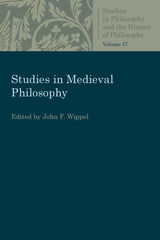
Studies in Medieval Philosophy
John F. Wippel
Catholic University of America Press, 2018
A collection of essays on the medieval period in philosophy.
[more]
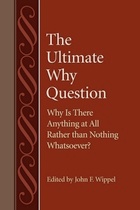
The Ultimate Why Question
Why Is There Nothing at All Rather than Nothing Whatsoever?
John F. Wippel
Catholic University of America Press, 2011
This volume gathers studies by prominent scholars and philosophers about the question how have major figures from the history of philosophy, and some contemporary philosophers, addressed "the ultimate why question": why is there anything at all rather than nothing whatsoever?
[more]
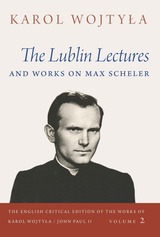
The Lublin Lectures and Works on Max Scheler
Karol Wojtyla
Catholic University of America Press, 2023
The Catholic University of America Press is honored to publish the English Critical Edition of the Works of Karol Wojtyła/John Paul II. Under the auspices of an international editorial board, the English Critical Edition will comprise more than 20 volumes, covering all of John Paul’s writings and correspondence in the years before and during his papacy.
This collection is essential for several reasons. For one thing, gaining access to the saint’s writings has posed a significant challenge. Except for official papal addresses and documents preserved and disseminated by the Vatican, St. John Paul’s works have been scattered and limited. Many documents need a new translation. Finally, English-language audiences have faced the challenge, even in the case of published texts of dealing with several languages, various translations, and textual idiosyncrasies.
The second volume of the series presents Wojtyła’s lectures at the Catholic University of Lublin and his works on Max Scheler. This volume consists of three parts: Karol Wojtyła’s lectures at the Lublin University from 1954 to 1957 (during three academic years); Wojtyła’s articles related to the ethical issues discussed in the Lublin lectures, and his habilitation thesis on Max Scheler from 1953 with other essays related more closely to Scheler’s thought.
As was the case with Volume 1, Volume 2 also relies on the original manuscripts and typescripts of Wojtyła’s works. These original texts were compared with the Polish published editions, and the significant differences between them were marked in the scholarly apparatus. Some of the essays in this volume were never published in English, others were never published before.
[more]
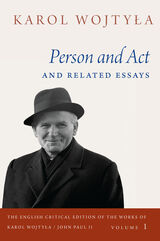
Person and Act and Related Essays
Karol Wojtyla
Catholic University of America Press, 2021
The Catholic University of America Press is honored to announce the publication of the first volume of the critical English edition of The Collected Works of Karol Wojtyła/John Paul II. In conjunction with an international editorial board, the English Critical Edition will comprise 20 volumes, covering all of his writings and correspondence both in the years before and during his papacy.
What makes this collection so important is that access to his writings have been a significant challenge. Except for official papal addresses and documents preserved and disseminated by the Vatican, his works have been scattered and limited, or in need of a new translation. Finally, English-language audiences have faced the challenge, even in the case of published texts, of working across multiple languages and translations and of dealing with textual idiosyncrasies.
The inaugural volume of this collection is Person and Act, together with related essays, which is in many respects constitutes Karol Wojtyła’s most profound and well-known philosophical work. Originally published in 1969 as Osoba I czyn, this work of metaphysics and philosophy is widely influential even though it is highly challenging intellectually and has heretofore posed difficulties for translators.
[more]
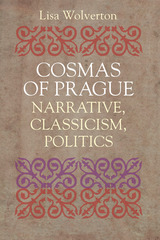
Cosmas of Prague
Lisa Wolverton
Catholic University of America Press, 2014
Please fill in marketing copy
[more]
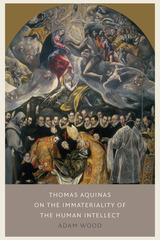
Thomas Aquinas on the Immateriality of the Human Intellect
Adam Wood
Catholic University of America Press, 2020
The chief aims of Thomas Aquinas on the Immateriality of the Human Intellect are to provide a comprehensive interpretation of Aquinas's oft-repeated claim that the human intellect is immaterial, and to assess his arguments on behalf of this claim. Adam Wood argues that Aquinas's claim refers primarily to the mode in which the human intellect has its act of being. That the human intellect has an immaterial mode of being, however, crucially underwrites Aquinas's additional views that the human soul is subsistent and incorruptible. To show how it does so, Wood argues that the human intellect's immateriality can also be put in terms of the impossibility of explaining its operations in terms of coordination between bodily parts, states and processes. Aquinas's arguments for the human intellect's immateriality, therefore, can be understood as attempts to show why intellectual operations cannot be explained in bodily terms. The book argues that not all of them succeed in this aim and also proposes, however, a novel interpretation of Aquinas's argument based on human intellect's universal mode of cognition that may indeed be sound. Wood concludes by considering the ramifications of Aquinas's position on matters pertaining to the afterlife.
Thomas Aquinas on the Immateriality of the Human Intellect represents the first book-length examination of Aquinas's claim that the human intellect is immaterial, and so — given the centrality of this claim to his thought — should interest any scholars interested in understanding Thomas. While it focuses throughout on careful attention to Aquinas's texts along with the relevant secondary literature, it also positions Thomas's thought alongside recent developments in metaphysics and philosophy of mind. Hence it should also interest historically-minded metaphysicians interested in understanding how Thomas's hylomorphism intersects with recent work in hylomorphic metaphysics, philosophers of mind interested in understanding how Thomas's philosophical psychology relates to contemporary forms of dualism, physicalism and emergentism, and philosophers of religion interested in the possibility of the resurrection.
[more]
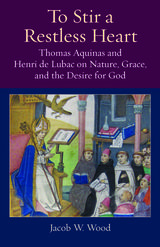
To Stir a Restless Heart
Jacob W. Wood
Catholic University of America Press, 2019
To Stir a Restless Heart tells for the first time the story of how Thomas Aquinas conversed with his contemporaries about the dynamics of human nature’s longing for God, and documents how he deliberately utilized Greek, Arabic, Hebrew, and Latin sources to develop a version of Aristotelian natural desire that was uniquely Augustinian: natural desire seeks the complete fulfillment of human nature “insofar as is possible,” and so comes to rest in the highest end that God offers to it. Depending on whether God offers the free gift of grace to humanity, one and the same natural desire can come to rest in knowing God through creatures or seeing God directly.
[more]
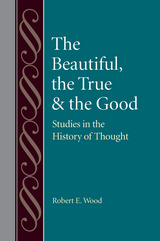
The Beautiful, The True and the Good
Robert E. Wood
Catholic University of America Press, 2015
"Among the foremost Catholic philosophers of his generation. He has utilized the fullness of the Catholic intellectual tradition to brilliantly take the measure of modern philosophical thought . . . This volume is an expression of Robert Wood's singular philosophical outlook." -Jude Dougherty, dean emeritus, school of philosophy, The Catholic University of America
[more]
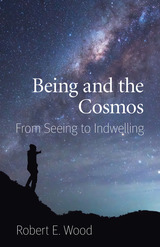
Being and the Cosmos
Robert E. Wood
Catholic University of America Press, 2018
Robert Wood’s aim in Being and the Cosmos<\i> is to reestablish a speculative view of the cosmos that goes back to the ancient Greeks and that corresponds to the holism of contemporary physics. There are two sets of problems in contemporary thought that militate against any such attempt. Most widespread is scientific reductionism in biology and neuroscience that explains awareness in terms of the mechanisms that underlie it. The second is the widespread attack in philosophy itself on speculative holism by deconstruction and anti-foundationalism.
In Being and the Cosmos<\i>, the tack against both is to make explicit the character of the mind that sees and thinks, that actively takes up commitment to the truth available in the disciplines involved. The basic ground of this position rests upon the functioning of the notion of Being that opens up the question of the character of the Whole and the human being’s place in it. Thus position the treatment of the notion of Being as foundation and as orientation toward the Whole between the attack on reductionism and on deconstruction and anti-foundationalism. Wood concludes with a multidimensional sketch of an evolutionary view of the cosmos whose initial phases contain the potentialities for life, sensibility, and intellect as cosmic telos. The holism of contemporary physics has to be reconfigured in terms of this observation. Both reductionists and dualists should know that matter itself has to be re-minded and that mind itself matters.
In Being and the Cosmos<\i>, the tack against both is to make explicit the character of the mind that sees and thinks, that actively takes up commitment to the truth available in the disciplines involved. The basic ground of this position rests upon the functioning of the notion of Being that opens up the question of the character of the Whole and the human being’s place in it. Thus position the treatment of the notion of Being as foundation and as orientation toward the Whole between the attack on reductionism and on deconstruction and anti-foundationalism. Wood concludes with a multidimensional sketch of an evolutionary view of the cosmos whose initial phases contain the potentialities for life, sensibility, and intellect as cosmic telos. The holism of contemporary physics has to be reconfigured in terms of this observation. Both reductionists and dualists should know that matter itself has to be re-minded and that mind itself matters.
[more]
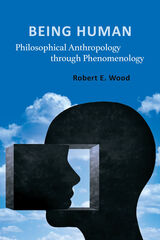
Being Human
Philosophical Anthropology through Phenomenology
Robert E. Wood
Catholic University of America Press, 2022
Being Human is the fruit of many years teaching Philosophical Anthropology, conducting Phenomenological Workshops, and reading classic texts in the light of a reflective awareness of the field of experience. Being Human is intended to look to what is typically assumed but not examined in much of current philosophical literature.
Today what typically appear as philosophical are textual studies that draw upon wide-ranging scholarship to learn how past thinkers used to think; or works that tend either to be “high-flying,” operating at levels of abstraction far removed from experience and written in arcane style, and thus, for both reasons, difficult to assess (much of Continental thought); or minutely focused upon particular claims and the arguments that can be advanced for and against them (Analytical thought); or deconstructing texts to show how they do not fully work (the followers of Jacques Derrida). Scholarly study, abstract constructions, refined arguments, and deconstructive strategies are each important in their own way; but all take place within the structure of the field of experience which is typically assumed without paying explicit attention to it. Especially in philosophy of mind, the overall field of experience has too often been ignored, usually in favor of some conjecture as to how our ordinary categories would have to be changed when neuro-physiology will be far enough advanced to explain all our behavior.
Robert E. Wood claims that it is best to understand what it is that is supposed to be explained before conjecturing about possible explanations. But when you do that, you will have to come to terms with what it means to seek explanation, what a Who is that seeks it, and why it is sought.
[more]
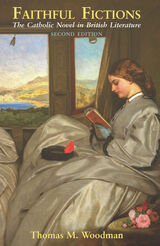
Faithful Fictions
The Catholic Novel in British Literature
Thomas M. Woodman
Catholic University of America Press, 2022
Catholic writers have made a rich contribution to British fiction, despite their minority status. Evelyn Waugh, Graham Greene, and Muriel Spark are well-known examples, but there are many other significant novelists whose work has a Catholic aspect. This is the first book to survey the whole range of this material and examine whether valid generalizations can be made about it. In charting such fiction from its development in the Victorian period through to the work of contemporaries such as David Lodge, the author analyses its complex relationships with changes in British society and the international Church. There is more than one way of being a Catholic, as Woodman shows, but he also demosntrates that many of these writers share common themes and a distinctive perspective. They often wish in particular to use their religion as a weapon against what they portray as a complacent Protestant or secular society. Their consciousness of writing in the midst of such a society gives a special edge to their treatments of the perennial Catholic themes of suffering, sin and sex. It also has implications for literary form and relates to what has been seen as the extremist mode of Catholic fiction. The final question that Woodman puts is whether the changes in the Church since the Second Vatican Council must inevitably lead to the loss of this distinctive Catholic contribution to the novel.
[more]
READERS
Browse our collection.
PUBLISHERS
See BiblioVault's publisher services.
STUDENT SERVICES
Files for college accessibility offices.
UChicago Accessibility Resources
home | accessibility | search | about | contact us
BiblioVault ® 2001 - 2024
The University of Chicago Press









